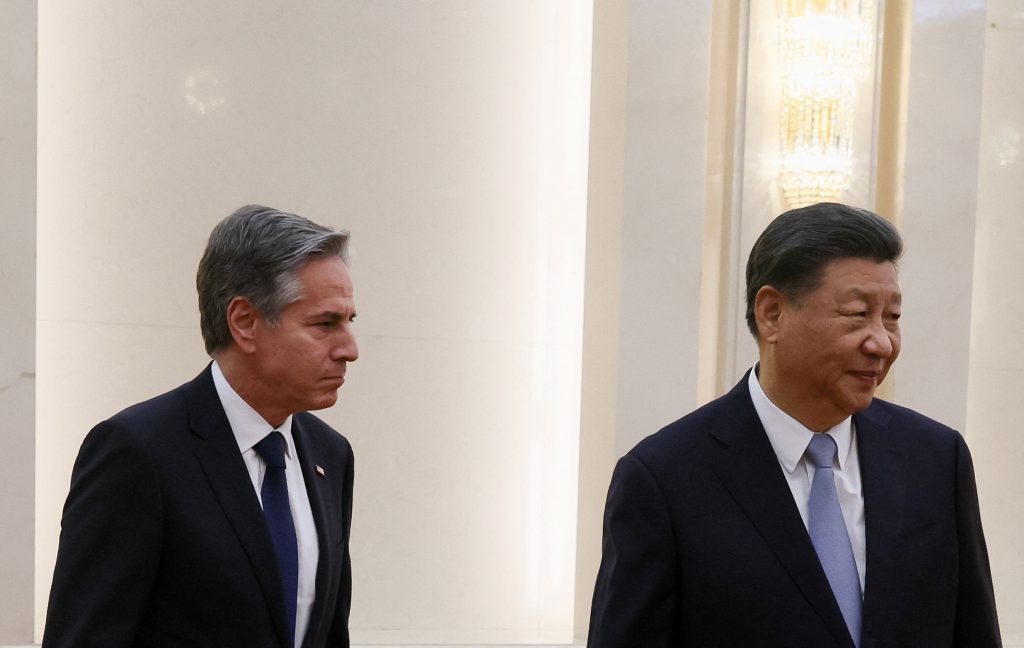 FILE PHOTO: U.S. Secretary of State Antony Blinken meets with Chinese President Xi Jinping in the Great Hall of the People in Beijing, China, June 19, 2023. REUTERS/Leah Millis/Pool/File Photo
FILE PHOTO: U.S. Secretary of State Antony Blinken meets with Chinese President Xi Jinping in the Great Hall of the People in Beijing, China, June 19, 2023. REUTERS/Leah Millis/Pool/File Photo Generative artificial intelligence (A.I.) in US-China tech battle is emerging as the new battleground, intensifying tensions despite recent talks between the two nations.
- US-China conflict over key technologies, such as semiconductors, is expected to shift towards generative A.I.
- Former President Donald Trump’s trade war initiated the tech battle, with the US imposing restrictions on China’s access to critical technologies.
In the battle for tech supremacy between the United States and China, a new battleground is emerging. The clash between the two nations over key technologies, such as semiconductors, has prompted experts to believe that generative A.I. will be the next focal point in this escalating conflict.
This development comes as analysts predict that despite recent talks between U.S. Secretary of State Antony Blinken and Chinese President Xi Jinping, the tensions in the tech sector are far from over.
“The status quo isn’t likely to change much on any front from sanctions to business pressure,” warned Abishur Prakash, CEO of The Geopolitical Business, a Toronto-based advisory firm, according to CNBC.
The tech battle between the U.S. and China has been ongoing, with former President Donald Trump initiating a trade war that dragged technology into the fray. The U.S. has imposed restrictions on China’s access to critical technologies, particularly semiconductors. Last year, the U.S. introduced sweeping rules to cut China off from major tools and components necessary for advanced chip manufacturing, potentially crippling China’s chip industry. The U.S. has rallied its allies to enforce strict export rules on technology to China.
“The U.S.-China battle for technology supremacy is about to enter its primetime,” stated Abishur Prakash.
With a focus on boosting its domestic technology, the U.S. has allocated substantial funding for semiconductors, including the $52 billion provided through the Chips and Science Act. But attention is now shifting to generative artificial intelligence (A.I.) because of the US-China tech battle.
“There will likely be more attempts coming from Washington to target the development in China of some types of applications, and generative AI could be in the crosshairs in the coming year,” said Paul Triolo, the technology policy lead at consulting firm Albright Stonebridge.
Generative A.I., exemplified by applications like ChatGPT, relies on large language models trained on vast amounts of data to understand and respond to user prompts. The processing power required for this training depends on specific semiconductors, such as those provided by U.S. company Nvidia, a market leader in such chips. Therefore, part of the U.S.’s current restrictions aims to limit China’s access to Nvidia’s crucial chips, potentially impeding China’s A.I. development.
Yet, Washington is conducting an outbound investment review to establish rules for American investment in foreign companies, which may include restrictions on investments related to A.I. technologies.
China, recognizing the strategic importance of A.I. development, has been quick to respond to the surge in generative A.I. technologies. Chinese technology giants, including Baidu and Alibaba, have announced plans and initiated trials for their own ChatGPT competitors. While China has implemented regulations to align A.I. development with its strict internet rules, the government is determined to boost the domestic industry.
China’s efforts to reduce dependence on U.S. technology are evident in the development of its own semiconductors by Alibaba and Baidu. Although these chips have not been affected by U.S. sanctions so far, they remain an area of concern for both the government and technology companies.
The recent meeting between Blinken and Xi may have addressed certain issues related to technology, with the U.S. likely raising concerns about Micron’s treatment and China discussing export controls. But both nations remain in a stalemate, with Blinken emphasizing areas of cooperation while underscoring the U.S.’s commitment to protecting its technology.
Inside Telecom provides you with an extensive list of content covering all aspects of the tech industry. Keep an eye on our Tech sections to stay informed and up-to-date with our daily articles.